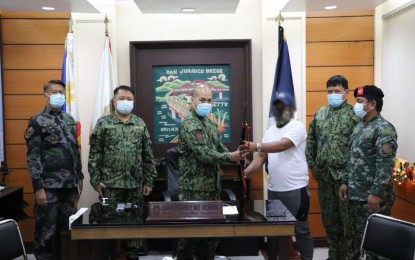
BACK TO THE FOLD. A rebel hands over a firearm to Police Eastern Visayas regional director, Brig. Gen. Ronaldo de Jesus, in this Dec. 10, 2020 photo. Despite the pandemic, Eastern Visayas region has been gaining ground in its fight against the communist terrorist group New People’s Army (NPA) this year with the dismantling of more guerrilla fronts and persuading more rebel fighters to surrender. (Photo courtesy of Philippine National Police Region 8)
TACLOBAN CITY – This year amid the pandemic, Eastern Visayas has been gaining ground in its fight against the New People’s Army (NPA) with the dismantling of more guerrilla fronts and persuading more rebel fighters to surrender.
It is on track with its goal to wipe out insurgency by 2022. Of the nine guerrilla fronts monitored this 2020, four have been dismantled in Samar province and some parts of Leyte.
The remaining five fronts are in Northern Samar and Eastern Samar provinces. The target is to disband the remaining organized group of fighters by end of 2021 or early 2022, said Maj. Gen. Pio Diñoso III, commander of the Philippine Army's 8th Infantry Division, on Friday.
“In Leyte and some areas in Samar, we have clashed with rebels recently since they have already lost their supporters in the community. Every time residents saw them in their areas, government security forces are immediately informed, resulting to a firefight,” Diñoso told the Philippine News Agency (PNA).
Unorganized
The remaining members of the NPA are no longer organized, but they still exist to continue their extortion activities and spread the communist ideology, the official said.
The weakening of NPA in Eastern Visayas is a result of a whole-of-nation approach deploying retooled community support program (RCSP) through linking arms between basic service providers from the central government, community participation group from the local governments, and security sector from the military and police.
“In the past, we do the job of almost all government agencies since we are the only group that can reach remote areas. Under RCSP, other officials are on the ground now talking to people. All peace stakeholders are part of ending insurgency,” Diñoso said.
From January to November, the RCSP team held dialogues in far-flung villages of Basey, Sta. Rita, Pinabacdao, and Marabut in Samar; Borongan, Maydolong, General Macarthur, Giporlos, Quinapondan, and Balangiga in Eastern Samar. Still ongoing are RCSP activities in Maydolong, Llorente, and Balangkayan in Eastern Samar.
The RCSP team is to identify issues and concerns in remote communities threatened by the communist terrorist group NPA for consideration of concerned government agencies and local government units.
Convergence
Philippine National Police (PNP) Eastern Visayas regional director, Brig. Gen. Ronaldo de Jesus, said the tasks of these teams are to facilitate solutions for those identified problems through the convergence of efforts of different government agencies supervised by the local task force on ending local communist armed conflict.
“This is a tool to attain the whole of government approach in partnership with national government agencies and local government units. Despite calamities in many areas in the country, our government is still here in Samar helping the poor,” de Jesus said.
The PNP reported that more armed rebels have been persuaded to abandon the communist ideology this year.
From September to the third week of December alone, at least 24 armed rebels have voluntarily yielded to the police and Philippine Army units.
De Jesus said the PNP is stepping up efforts to participate in the National Task Force to End Local Communist Armed Conflict (NTF-ELCAC), to entice more local communists abandon their “nonsensical armed struggle.”
“As we continue to bring quality police service closer to the communities, matched with our sustained persuasion efforts, we were able to lead these misguided (people) back to their families. The government is more than willing to welcome those who wish to give up the path of violence and return to the folds of the law, especially this Christmas season,” he added.
Broken promises
Broken promises of NPA leaders, longing to be with their families, and their aspirations to live peacefully are some reasons why NPA members surrendered to authorities.
The voluntary surrender of former fighters of the NPA in Leyte and Samar provinces exemplifies how a whole-of-nation approach works to end the local communist armed conflict, an official of the Department of the Interior and Local Government (DILG) said.
DILG regional director Karl Caesar Rimando believes that the stronger ties between the police, armed forces, the intelligence sector, and the community have convinced armed rebels to yield to authorities.
“With the increasing ownership shouldered by local and national governments to identify and resolve festering issues, residents of remote villages will no longer be easily swayed by the lies of communist insurgents,” Rimando said in an earlier statement.
The official asked former rebels to encourage those still “involved in the fading rebellion to approach local government units or any law enforcement officer who will facilitate their return to a peaceful and productive life.”
He lauded local government units for joining the drive to wipe out insurgency in their areas through the formation of task force ELCAC.
Base on the third-quarter report of regional task force ELCAC, all seven cities and 135 towns in the region have formed their task forces. About 30 percent of the region’s 4,390 villages have their task forces.
The formation of the task force operationalizes Executive Order 70 issued by President Rodrigo Duterte on Dec. 4, 2018.
The directive also institutionalizes a “whole-of-nation approach” in attaining an inclusive and sustainable peace.
The NPA, which has been waging a five-decade armed struggle against the government is listed as a terrorist organization by the United States, the European Union, the United Kingdom, Australia, Canada, New Zealand, and the Philippines. (PNA)
